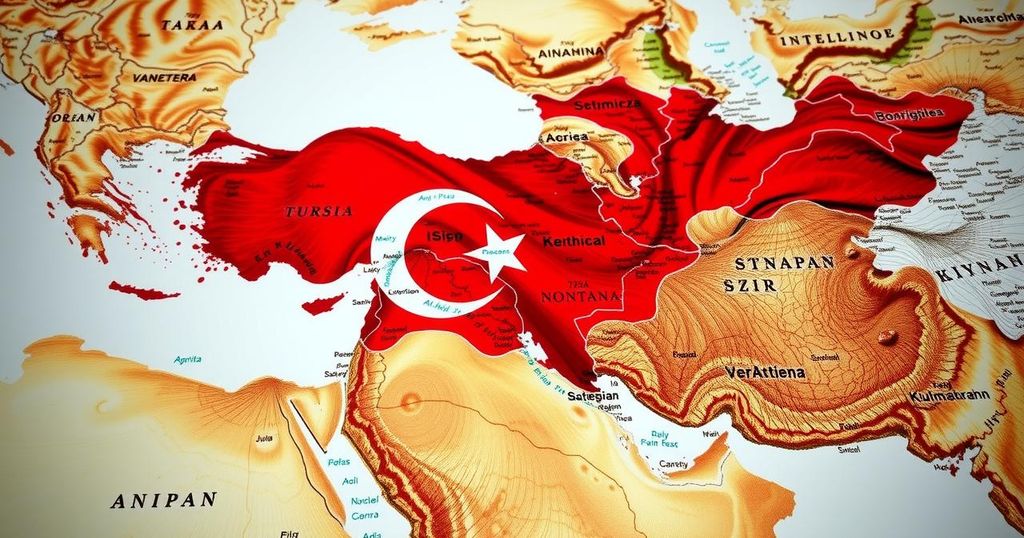Turkey’s Ascendance: A New Paradigm in Middle Eastern Geopolitics

The article examines Turkey’s ascension as a regional power following the decline of the Assad regime in Syria, contrasting its influence against Iran’s diminishing presence. It highlights Turkey’s strategic support for Syrian rebels, its expanding reach into neighboring regions, and the implications for power dynamics among traditional regional players, particularly Saudi Arabia. The text underscores Turkey’s multifaceted approach to foreign policy, emphasizing its growing stature in Middle Eastern geopolitics.
The geopolitical landscape of the Middle East is experiencing a significant transformation, largely attributable to Turkey’s escalating influence, characterized as a “full moon” in contrast to the waning of Iran’s “Shia crescent.” Following the decline of the Assad regime in Syria, Turkey has emerged as a crucial regional power due to its steadfast support for Syrian rebels. This involvement has involved the provision of intelligence and political backing, enabling the rebels to achieve significant victories with notably less violence compared to previous conflicts in Syria
Over years of persistent support for the opposition in northwestern Syria, Turkey has secured the rebels’ capacity to reorganize and strengthen through tactical ceasefires. Concurrently, Iran’s power has been diminished by external pressures, including Israeli strikes, as well as Russian preoccupations with other global conflicts, particularly in Ukraine. This combination of factors has made the Assad regime’s downfall not only feasible but seemingly inevitable.
Turkey’s newfound influence is anticipated to reverberate across Iraq, where its historical presence in the northern regions provides leverage, especially as a Sunni-led government emerges in Syria. This evolution could challenge Iranian-backed Shia militia domination, mirroring shifts underway in Syria.
However, Turkey’s strategic aspirations are not confined to Syria and Iraq. It has expanded its reach into numerous strategic territories, including Africa and the Caucasus. Turkey’s mediation in resolving tensions between Somalia and Ethiopia shortly after the Syrian rebels’ victory exemplifies its growing diplomatic role. In addition, Turkey’s involvement in Libya enhances its foothold in the Mediterranean energy sphere and its position as a power broker in North Africa.
Turkey’s engagement extends into Afghanistan, where relationships with the Taliban have flourished since their return to power in 2021. Furthermore, Ankara’s military and diplomatic support for Azerbaijan during the Nagorno-Karabakh war has solidified its influence in the Caucasus region, positioning Turkey as a critical player amidst rising complexities in regional power dynamics.
The changing dynamics pose challenges for traditional powers such as Saudi Arabia, as Turkey’s Sunni identity presents a more nuanced rival. While Saudi Arabia historically positioned itself as a bulwark against Iranian influence, Turkey’s rising prominence provides an alternative vision aligned with broader Sunni aspirations. This situation threatens to undermine Saudi Arabia’s narrative of regional leadership.
Unlike Iran, which often resorts to proxy conflicts to amplify its influence, Turkey has established legitimacy by directly supporting local Sunni factions and engaging with broader political movements. This strategy promotes Turkey as a pan-Sunni representative, complicating the narrative for Saudi Arabia and its allies. The return of Islamic influence following events reminiscent of the Turkish-backed government in Egypt under Mohamed Morsi emphasizes these shifting sentiments.
In recent years, Iran’s ambitions, embodied through its “Shia crescent,” have faced substantial challenges. The geographic corridor extending from Tehran to the Mediterranean had previously allowed Iran to project strength through proxies. However, with Turkey’s rise, this landscape is undergoing rupture, especially as the supply routes connecting Tehran to Beirut face growing obstacles.
Iran’s waning authority is echoed in Lebanon, where Hezbollah’s grip is increasingly challenged amidst domestic turmoil and continued Israeli pressure. As Turkey influences Damascus away from Iran’s orbit, we witness a significant recalibration of allegiances in the region.
Turkey’s ascension is reflective of an assertive strategy addressing both security and economic concerns, navigating through Kurdish threats while promoting a multifaceted approach that blends military action, diplomatic outreach, and economic investments. This positions Turkey to transcend religious and ideological divides, creating avenues of influence distinct from Iran’s sectarian focus.
Concerns surrounding this power shift pervade the region, particularly among Saudi Arabia, the UAE, and Israel. As Turkey’s influence grows, the dynamics of Middle Eastern geopolitics will increasingly pivot toward understanding Turkey’s regional aspirations and strategies. Consequently, it is no longer a question of whether Turkey will seize a dominant role in the Middle East, but rather how it will redefine hierarchies within this complex political landscape.
The article discusses the shifting geopolitical dynamics in the Middle East, focusing on Turkey’s increasing influence following the decline of the Assad regime in Syria. It contrasts Turkey’s growing power with Iran’s diminished status as a result of recent conflicts and alliances, particularly in light of Turkey’s engagement in various regions, including Iraq, Africa, and the Caucasus. Furthermore, it addresses the emerging concerns of regional powers like Saudi Arabia regarding Turkey’s assertive foreign policy and its implications for Sunni and Shia relationships in the region.
In summary, Turkey’s rise as a formidable power in the Middle East signifies a profound shift in regional geopolitics, marked by the decline of Iran’s influence and the emergence of new dynamics among major regional players. Turkey’s unique blend of military, diplomatic, and economic initiatives establishes it as a significant force, effectively challenging the longstanding narratives of power centered around Iran. As the landscape continues to evolve, stakeholders must grapple with Turkey’s expanding role and its implications for future regional stability and alliances.
Original Source: www.theguardian.com








